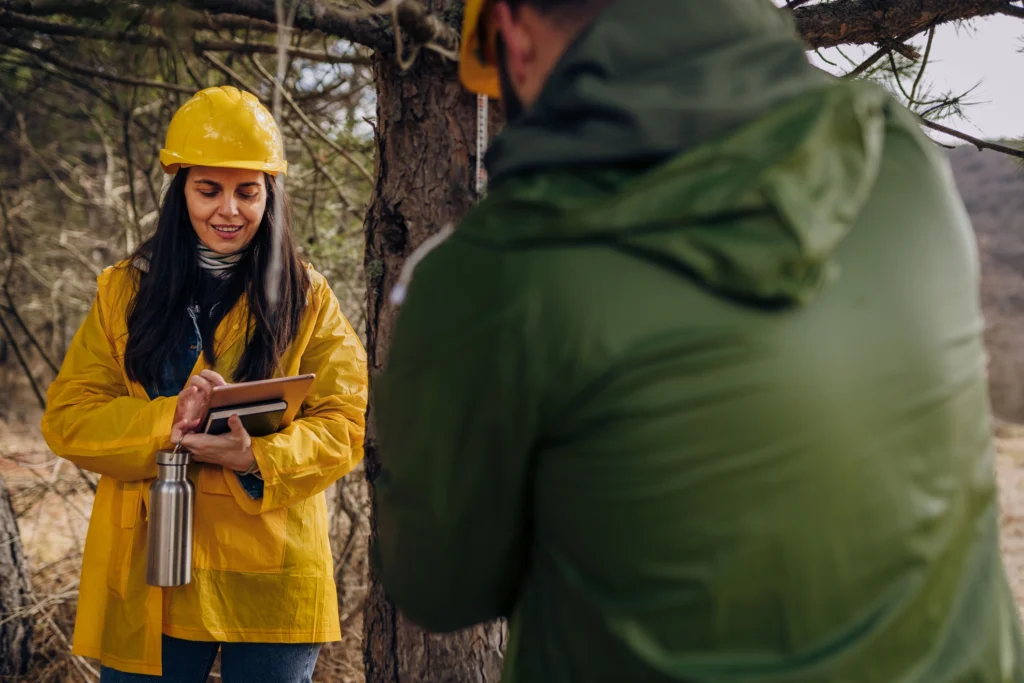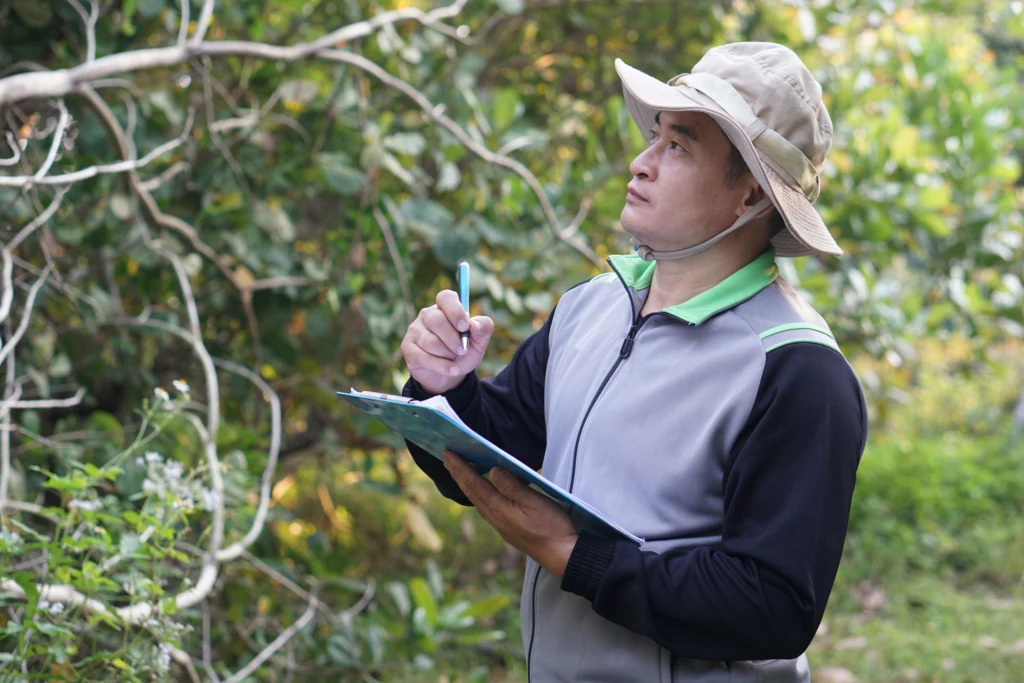
Biological Evaluations
Unsure if your project requires a bio survey? No problem. We’ve helped countless clients navigate potential requirements due to wildlife on or around their project sites.
Biological Surveys
Biological surveys, also referred to as “biosurveys”, are scientific assessments conducted to inventory flora and fauna within a defined area. These surveys provide crucial information to support environmental planning and conservation efforts. Specifically, biological surveys identify at-risk or endangered species, reveal biodiversity trends, and ensure compliance with laws protecting natural resources.
Companies across industries like construction, forestry, and oil and gas utilize biosurveys to evaluate how potential projects or operations could impact local plant, animal, and aquatic life.
Our biosurvey reports meet rigorous methodology standards and adhere to agency guidelines from the Environmental Protection Agency (EPA), U.S. Fish and Wildlife Service, U.S. Army Corps of Engineers, and state regulatory bodies. Whether your project faces environmental permitting requirements or you simply want baseline documentation of current ecological conditions, our team of field experts can deliver comprehensive biological surveys tailored to your needs.

What Does Diablo Green Have to Offer?
Biological Evaluations
We offer comprehensive site evaluations providing in-depth assessment of existing biological resources on your land or project site through systematic field surveys. Our specialists utilize standardized field techniques tailored to the project scope which may include:
- Vegetation mapping
- Wetlands delineation
- Wildlife and rare plant inventories
- Stream habitat and fish sampling
- Reporting presence of sensitive species
These field inventories allow us to evaluate habitats, identify constraints, characterize on-site and adjacent biological resources, and ultimately determine the potential impacts of proposed projects. Our analyses help guide project planning to avoid sensitive areas and minimize disturbance where possible.
Natural Resource Management
Proactive stewardship of ecosystems recognizes that conservation and economic progress can coexist through mindful planning. We assist both public and private landowners in implementing science-based land management strategies balancing human and environmental needs. Our services include:
- Baseline inventories
- Forest management plans
- Habitat enhancement initiatives
- Monitoring long-term ecological changes
- Planning recreational access with resource protection
Surveys for Towers and Other Constructions
Infrastructure and construction projects must clear environmental regulatory hurdles prior to breaking ground. We offer efficient and reliable biological surveys tailored to cellular tower installations, renewable energy projects, residential/commercial developments, utilities, and public infrastructure expansion. Our specialists inventory flora, fauna, aquatic resources, rare plants, and sensitive species that could reside in the project area. The final deliverable includes:
- Field Surveys and Inventories
- Biological Resource Assessments (species specific and/or general, i.e. raptor studies, sensitive plant assessments, endangered species specific surveys, etc.)
- Avian Nesting Surveys for Compliance with the Migratory Bird Treaty Act
- Section 7 Consultation with the United States Fish and Wildlife Service
- Biological Assessments
- Impact Assessments
- Environmental Review Documentation
Timely and accurate surveys for tower projects allows for construction to move forward while avoiding costly delays and potential fines due to mistakes in the process.

Types of Biological Surveys
We offer standard reporting deliverables meeting agency expectations and project timelines:
- General Biological Surveys provide a comprehensive overview of biological resources by documenting native vegetation and wildlife diversity, habitat types and quality, presence of all special-status species, and aquatic resources within the proposed project boundary.
- Focused Surveys hone in on specific sensitive species that have potential to occur in the project region based on historical records and suitable habitat. Focused surveys require very structured field techniques and scheduling optimized for maximum detection during active seasons when the species is present.
- Letter Surveys offer a concise summary of biological resources discussed in a technical memorandum format without exhaustive fieldwork or reporting formalities. These simplified surveys verify whether suitable habitat exists on site to support sensitive species identified on pre-approved agency lists. Desk reviews of existing documentation may substitute for site visits.
The Process of Conducting a Biosurvey
Each biological survey involves three phases:
- Initial planning – Assess project parameters, identify feasible methodologies, review existing documentation of biological resources in the vicinity, coordinate with agencies on sensitive species to target.
- Field work – Experienced biologists complete systematic field inventories using scientifically standardized sampling techniques aided by technologies like GPS and tablets. Field crews thoroughly survey vegetation, characterize habitat types, record all observations and collect supporting data like photographs and water samples.
- Analysis and reporting – Our experts analyze field data to produce professional-quality reporting supported by maps, figures and photographic evidence following agency protocols. We integrate findings across disciplines to produce meaningful ecological analyses of current site conditions with interpretations of how proposed projects could impact native flora and fauna. After submitting final reports, we continue advising clients on next steps for project clearance and permitting.
Regulatory Compliance and Guidance
Biological surveys provide the baseline inventory of plant, animal and aquatic life necessary to assess whether projects trigger permitting under environmental laws like:
- Endangered Species Act – Protects threatened and endangered species and their habitats. Surveys must document the presence/absence of such species.
- Clean Water Act – Regulates discharges affecting quality of wetlands and waters. Surveys inform impact analyses of projects near streams or waterbodies.
- Migratory Bird Treaty Act – Protects migratory birds, their eggs, nests and habitats. Surveys record occurrences that must be considered during project timing and design.
- State and Local Regulations – Additional region-specific regulations govern species, habitats and protected lands. Local agencies apply these supplemental directives during project reviews so biological surveys must address applicable state and municipal requirements.
With our vast experience securing environmental clearances for hundreds of projects, we understand these intricate regulatory processes and unique information needs of permitting agencies.
Diablo Green ensures your biological surveys deliver data to satisfy agency requests and prevent delays during project approvals. Throughout the permitting process we communicate on your behalf to negotiate favorable outcomes meeting compliance while advancing projects on schedule.

Why Choose Diablo Green?
Demonstrated Expertise and Credibility
Our entire professional staff, including principals leading each project, maintain ecology credentials demonstrating our collective expertise. Our specialists’ skills, ropes-course certifications, taxonomic authorities, and breadth of field experience produce reliable biosurveys that withstand scrutiny from agencies, stakeholders, and if necessary – the courts.
Commitment to Environmental Conservation
Our team actively contributes to habitat restoration efforts, partners with land trusts, and provides nature education – because inspired environmental awareness fosters impactful conservation outcomes.
We understand every project we evaluate presents an opportunity to inform smarter development benefiting rather than degrading fragile ecological communities. Our commitment to conservation compels us to provide quality biological surveys so projects proceed sustainably.
Start Your Biological Survey for Your Tower Development Today!
Biological surveys require specialized expertise across multiple ecological disciplines like botany, wildlife biology, hydrology, taxonomy, conservation biology and environmental regulations. Diablo Green’s seasoned field crews leverage the latest advances in technology to conduct comprehensive surveys documenting sensitive habitats while our reporting delivers compelling analyses that equip clients to make smart planning decisions.
With proven reliability meeting stringent agency expectations, an authentic commitment to conservation, and custom surveys scalable to any project, we offer full-service biological consulting you can trust.
Frequently Asked Questions About Biological Surveys
What elements does a biological survey report contain?
Standard biological survey reports include the field survey methodologies, transect locations marked on maps, floral and faunal compendiums documenting all species observed, discussion of habitat quality and ecosystem health indicators, constraints analysis of sensitive areas, and evaluation of impacts from proposed projects with mitigation recommendations.
When should I request a biological survey?
Biological surveys are prudent to inform environmental planning for construction, forestry operations, infrastructure development, restoration initiatives or anytime projects could potentially disturb native vegetation, wildlife or aquatic resources. They establish ecological baselines prior to commencing activity.
How long does a biological survey take?
The fieldwork component involves multiple site visits spanning seasons to inventory the breadth of flora and fauna that inhabit or migrate through the project area. Depending on the size of the site, field surveys may take several weeks or months to complete. Report writing adds further time for data analysis and interpretation. Expect the entire process to range from six weeks for a letter survey on a small site up to a year for large acreages.
What factors influence cost for a biological survey?
Key cost drivers are the project acreage needing assessment, geographic remoteness and terrain complexity affecting access, the number of focused sensitive species surveys required, depth of reporting detail, and prevailing professional service rates in that region. Contracting an environmental firm familiar with local landscapes and species provides an economy. We offer free quotes customized to your specific project parameters.
What level of accuracy do biological surveys provide?
Field biologists sample vegetation transects and employ techniques intended to maximize detecting presence of sensitive species if they inhabit the project zone during current surveys. However, wildlife movement means surveys capture a snapshot. While data accuracy depends on effort invested, evolving ecological dynamics mean no biological survey furnishes absolute guarantees regarding species occupancy. Proper mitigation limits harm from uncertainties.
Can I provide input into the biological survey scope and methodologies?
Biological survey experts tailor objectives, field techniques and reporting deliverables to each project’s unique specifications as defined by the client. Preliminary planning involves scoping conversations to align on project data needs, permitting obligations, site conditions dictating viable survey methodologies, and scheduling milestones. Clients steer the process to serve their priorities.
How can biological surveys inform project planning?
Quality biological surveys mapping native flora/fauna occurrences, habitats and hydrological features allow designers and planners to modify project parameters in order to avoid disturbing sensitive ecosystems. For example, surveys may reveal endangered songbirds nesting in a construction zone prompting designers to reroute a roadway around forested breeding areas. This project adjustment minimizes permit issues later.
Ready to learn more about our services? Send us a note and we’ll reach out to you ASAP!